Our Curriculum
Please follow the link below to view School Performance Tables.
http://www.education.gov.uk/cgi-bin/schools/performance/school.pl?urn=120749
Our topics can be seen below. More information and home learning ideas can be found on Tapestry - on your child's class page or on their home-school communication page which should also be used if you have any questions about your child's learning.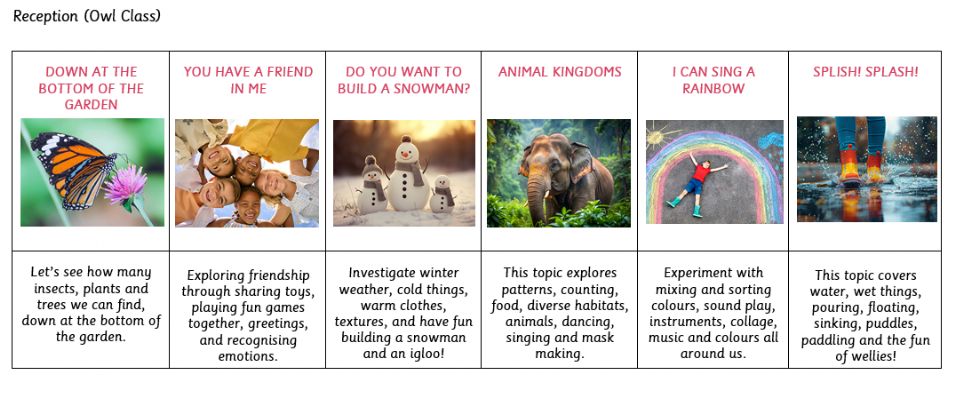
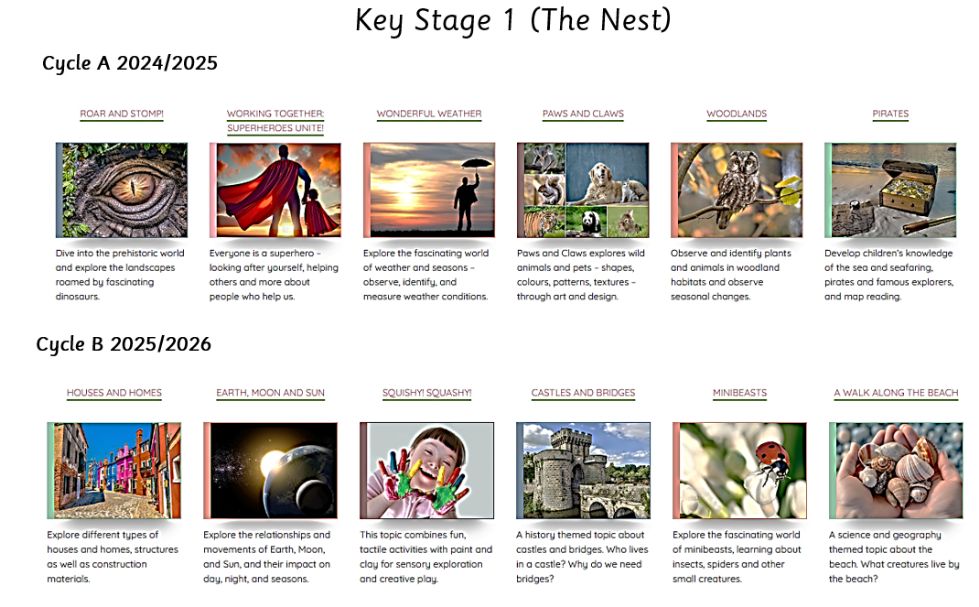
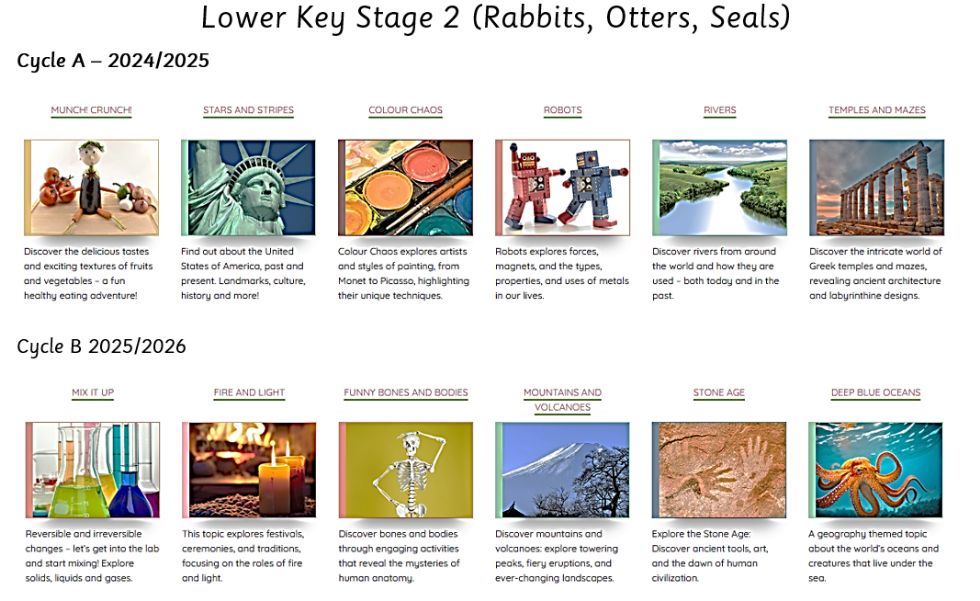
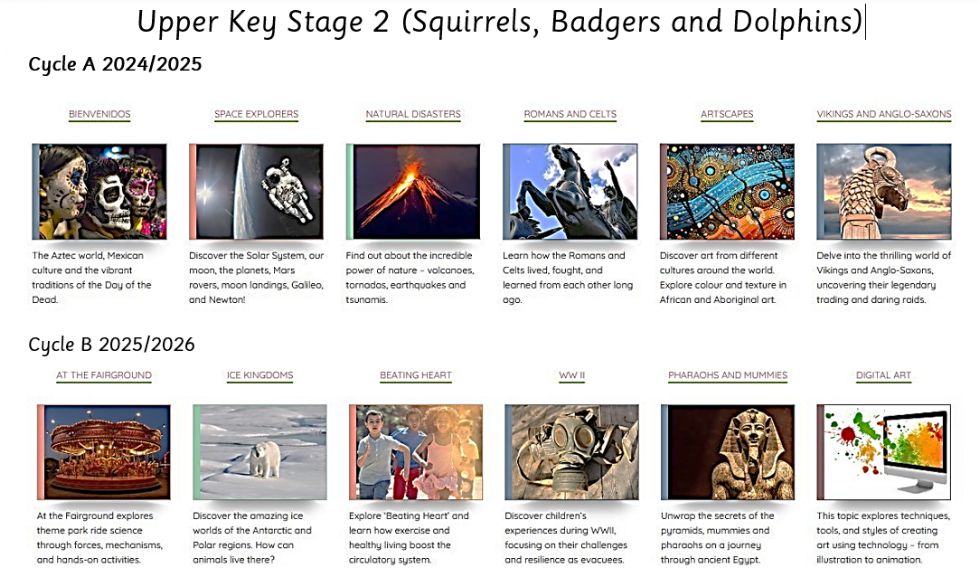
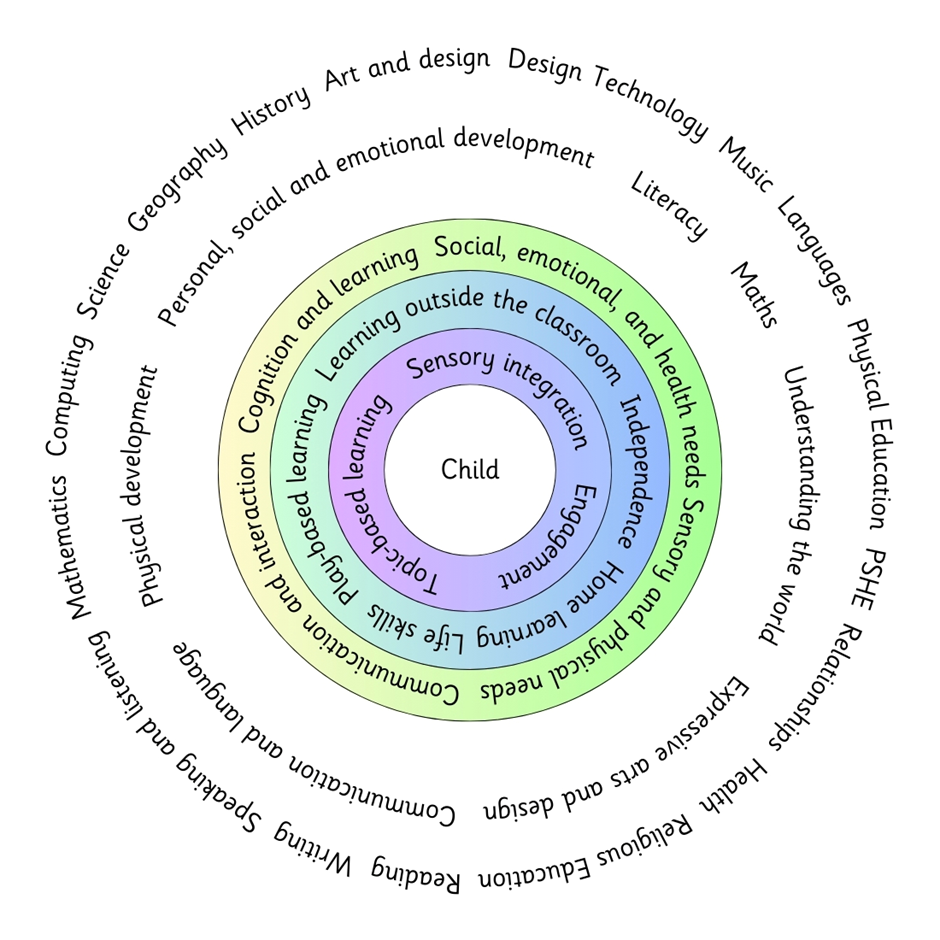
Curriculum Statement
Intent
We ‘meet the child where they are’ – they are at the centre of their learning, we work with their strengths and support them to make their next steps on a bespoke level. Our aim is to inspire a love of learning as well as the ability and desire to continue learning. We want to ensure that our children optimise their potential - academically, socially, emotionally and spiritually - at school, at home, within their community and beyond. We also believe that families are their child’s first teachers. As such, we share topic-based suggestions for home learning on a termly basis; we ‘Work Together and Learn Together’.
The curriculum at GHA is designed to ensure that our children develop a broad understanding of our world, themselves and other people – in our local community and beyond. There is a clear and crucial focus on sensory integration, developing life skills, independence, communication and a lifelong love of learning, and on learning in a variety of ways and environments. Our children are inquisitive and creative and our curriculum gives them the chance to enhance these skills. The curriculum also ensures preparation for life in modern Britain and gives a breadth of opportunities to develop motor skills, social skills and an understanding of others, linking to social, moral, spiritual and cultural education. Extensive use is made of our local environment with regular visits and visitors enhancing our cultural capital provision.
We have a topic-based approach to support children to make links between their learning in different subjects and year groups. Some children learn within the engagement model; some at a subject-specific level. Active engagement is always our priority and this is optimised through a creative and practical delivery style. Topics are organised throughout school and within Key Stages to ensure coverage of subjects, skills, concepts and knowledge. The detailed knowledge and vocabulary progression within our curriculum ensures that our staff can deliver lessons in line with each child’s needs, ability and their prior experiences.
Implementation
Our curriculum is designed to recognise prior learning, areas of challenge and of emerging strengths and to provide active, engaging learning experiences.
Learning starts in the early years, where we start our key focuses on communication, attention and interaction, developing engagement skills, learning alongside and with others and settling into routines and activities.
During the ongoing redevelopment of our curriculum, we consulted with children, families and staff to ensure that the curriculum contains common interests and themes that had previously been successful and as such we continue to use a topic-based approach. Reading is promoted throughout the day and throughout the curriculum. Each topic has one or more key texts as well as several supporting texts that are used in lessons and also for the children to read at their leisure. Phonics is a priority throughout school; our phonics scheme is Little Wandle. Reading books are shared with families (online as well as books) and the children spend time in our Story Den choosing a sharing book to take home weekly.
We use a variety of approaches including Attention Autism (‘bucket’) group activities and TEACCH baskets for individualised, target-driven work, as well as more formal class or group learning. Children learn using a multi-sensory approach – sensory story bags, singing bags and mystery boxes capture attention and support engagement. Opportunities to learn outside the classroom and into the local community are plentiful – regular visits are made to a tennis club, swimming pool, garden centres, shops and parks to practise life skills, communication and to develop an understanding of the world around us. Throughout school, where appropriate, we use a PECS-based approach – using visual reinforcements to support receptive and expressive communication, and colourful semantics to support early writing skills.
GHA staff use every opportunity to promote fundamental British Values, independence, resilience and compromise. A developing understanding of the world is supported by a different local, regional or national theme each Friday afternoon in addition to the broad balance of topic work, for example; inter-school sports competitions, multicultural activities including Chinese New Year and Holi, theatrical and musical productions, external visitors such as historical actors, firefighters and dental nurses.
Impact
Our children show increasing levels of readiness to learn, and engagement in their learning – they are curious and keen to know more. This is reflected in their happiness on arrival to school, good attendance, and attainment in relation to their starting points. With the support of their families, they extend their learning beyond school, generalising their new knowledge and skills into truly real-life learning. Families share this with us via their Family Learning Homework, which we celebrate as a community each half term; we also welcome ongoing feedback about the children’s learning. The focus on a visually cued environment, routine and consistency of approach throughout school means that the children can focus on learning, rather than anxiety regarding managing change or unexpected events. Children develop fine and gross motor skills; their physical and emotional regulation needs are met throughout the day and they are able to communicate these to familiar staff. Children can identify, show and communicate their learning and some take part in formal testing.
Supporting the children to manage change within the supportive and familiar environment of GHA helps them to make progress across the curriculum at engagement level and subject-specific level and to develop the resilience and confidence to prepare them for the transition to secondary school and beyond. The significant focus on developing skills to support and develop independence gives the children executive function skills to support organisation and planning, resilience and compromise; practical skills learned during weekly cooking lessons and ‘learning outside the classroom’ sessions; communication in an appropriate format for each child and also strategies to enable them to regulate their feelings and behaviours. The children also gain knowledge of staying safe, for example sun safety, water safety, internet safety and road safety.
English
English is at the heart of everything we do. We aim to inspire and promote a love of reading for pleasure in our children and were delighted to be awarded Bronze in Lincolnshire's Reading Pledge in 2024. Our children regularly visit our cosy story den and take home a library book each week. Each topic has one or more engaging key texts, shared with the children via the use of Sensory Story Sacks and engagement activities. As well as English lessons focusing on reading, writing and communication, children consolidate their learning during daily Basic Skills sessions in which overlearning is prioritised. A key focus is communication; we want our children to be able to communicate functionally through an appropriate means for them. As such, we use communication boards, technology, visual cue cards and spoken language. We also include elements from SULP and NELI in our approach.
Phonics
In September 2024 we began following the Little Wandle phonics programme after working closely with Lincolnshire's English Hub.
Mathematics
Mathematics is taught on a bespoke level; we ensure coverage by following the White Rose maths scheme. We use individual assessments to ensure appropriacy of delivery, to support our children to make the best progress they can. Our aim is that our children develop mathematical skills, knowledge and the ability to apply these skills and knowledge in the real world. Skills, knowledge and vocabulary are presented in different visual and practical ways to support children to generalise their learning across contexts - for example we want our children to know that 5 can be a numeral, a word, an amount, a number on a clock or an amount of time in minutes, seconds or hours. Maths is taught with real-life links and as creatively and practically as possible. We use overlearning and repetition to support consolidation of new concepts.
Science
Our children experience and engage with a variety of activities that involve lots of scientific investigations. The children are encouraged to think and investigate in a number of ways, both with the support of the adults and independently to develop their knowledge. Our practical approach to the teaching of science ensures that children are encouraged to think scientifically based on what they experience, broadening their own thinking skills and developing their understanding of scientific concepts.
Humanities
We aim to provide a stimulating and enriching humanities curriculum. The humanities curriculum consists of Geography, History, Religious Education. We aim to provide a curriculum which informs the children of historical events, ensures geographical and environmental understanding and provides them with a rich cultural, moral and spiritual understanding of the world through the teaching of Religious Education. Our approach to languages is to promote an understanding of different cultures and languages through our topic work. Our engaging, active and creative curriculum provides the children with key life-skills such as teamwork, empathy, communication, and a developing sense of independence.
We follow the Lincolnshire Agreed Syllabus for RE. Parents/carers do have the right to withdraw their child from all or part of our RE lesson; please contact the school office if you would like to do so - please see coverage below, which is delivered at a level appropriate to our children's level of understanding.
Christianity is compulsory at each Key Stage.
At Key Stage 1 pupils must study Islam
At Key Stage 2 pupils must study Hinduism and Islam
Key areas of enquiry:
1. God: What do people believe about God?
2. Being human: How does faith and belief affect the way people live their lives?
3. Community, worship and celebration: How do people express their religion and beliefs?
4. Life journey: rites of passage: How do people mark important events in life?
Creative Arts
Children explore a wide range of skills and media through a range of pedagogical approaches to the creative arts. The arts are a form of celebration, communication and expression. Drama, music, dance and art help children to develop self-awareness and confidence and to acquire empathy, teamwork and listening skills. Participation in the arts develops gross and fine motor skills and can be used to support all other areas of the curriculum. At Gosberton House Academy, we strive to offer a curriculum rich in the arts, inspiring and nurturing each individual, raising self-esteem and confidence; we were recently awarded Arts Mark Gold.
Technology
We believe that technology can support and dramatically enhance the lives of our children. We believe that mobile technology already merged with our ethos, pedagogy, vision and immersive environments will give our children a relevant and successful education which will enhance their learning opportunities. This will develop individuals and prepare them for the technological future in their everyday and working lives. We also aim to provide children with Design and technology skills that will ready them for future jobs and provide life skills. Children learn through stimulating and exciting DT projects.
Emotional Literacy/Well-Being
At Gosberton House Academy the promotion of Emotional Literacy is a core element of our work. We believe that emotional well-being and self –esteem are central to all aspects of social and academic learning. Personal, Social,
Health and Economic Education is a crucial aspect of our curriculum. We aim to ensure each child develops a deep understanding of not only themselves, but their peers and other members of our society. We strive to prepare them to become positive citizens of our community and try to ensure they understand the importance of a healthy and active lifestyle. Many different important concepts are taught, rehearsed and generalised; which not only prepare children for their future, but also ensure at present they are healthy, positive and confident individuals.
We encourage participation in a wide range of our extra-curricular activities and also through the local competitions we partake in throughout the year. Our children take part in lunchtime clubs (story den, lego club, art club), after school club, external tennis sessions and swimming lessons. We also have external visitors who bring new and different activities including theatre performances, Kin Ball and Table Cricket. The school was awarded Distinction by the Association for Physical Education, and Bronze in the Lincolnshire School Games Quality Mark.
Enterprise
The children’s economic understanding is also developed well through the enterprise aspects of our curriculum, which we strive to ensure they participate in throughout the year. We encourage them to work towards their personal aspirations and goals to develop self-esteem, confidence and a love for learning. These lifelong learning skills are developed through the use of project based learning. Some examples of this have included; selling snacks to raise money for our sister school in India; fund raising for class celebrations through making and selling crafts. The school operates a pupil Bank. Loans can be secured at 0% interest rates to fund enterprise initiatives.
Family Learning
The school operates a Family Learning approach to homework – our suggestions for topic-related projects and activities to support the development of life skills can be found in our school newsletters and also on Tapestry. Children have ongoing access to online learning platforms including Purple Mash and the Collins Hub to share their Little Wandle reading scheme books. The school holds a weekly Homework Club and termly Family Learning celebrations, to which families are invited.
GHA Community
The school participates in local community events including the Spalding Flower Festival, and supports wider community events by fundraising and raising awareness. We aim to support our children to take all learning opportunities and become lifelong learners. British Values are taught alongside SMSC. The school engages with various initiatives including Children's University, through which we commemorate, celebrate and mark local, national and international events and dates. GHA has also recently been awarded; UNICEF Gold Rights Respecting School, Silver Learning Outside the Classroom Silver, Arts Mark Gold, AfPE Award and Leading Parent Partnership Award.

